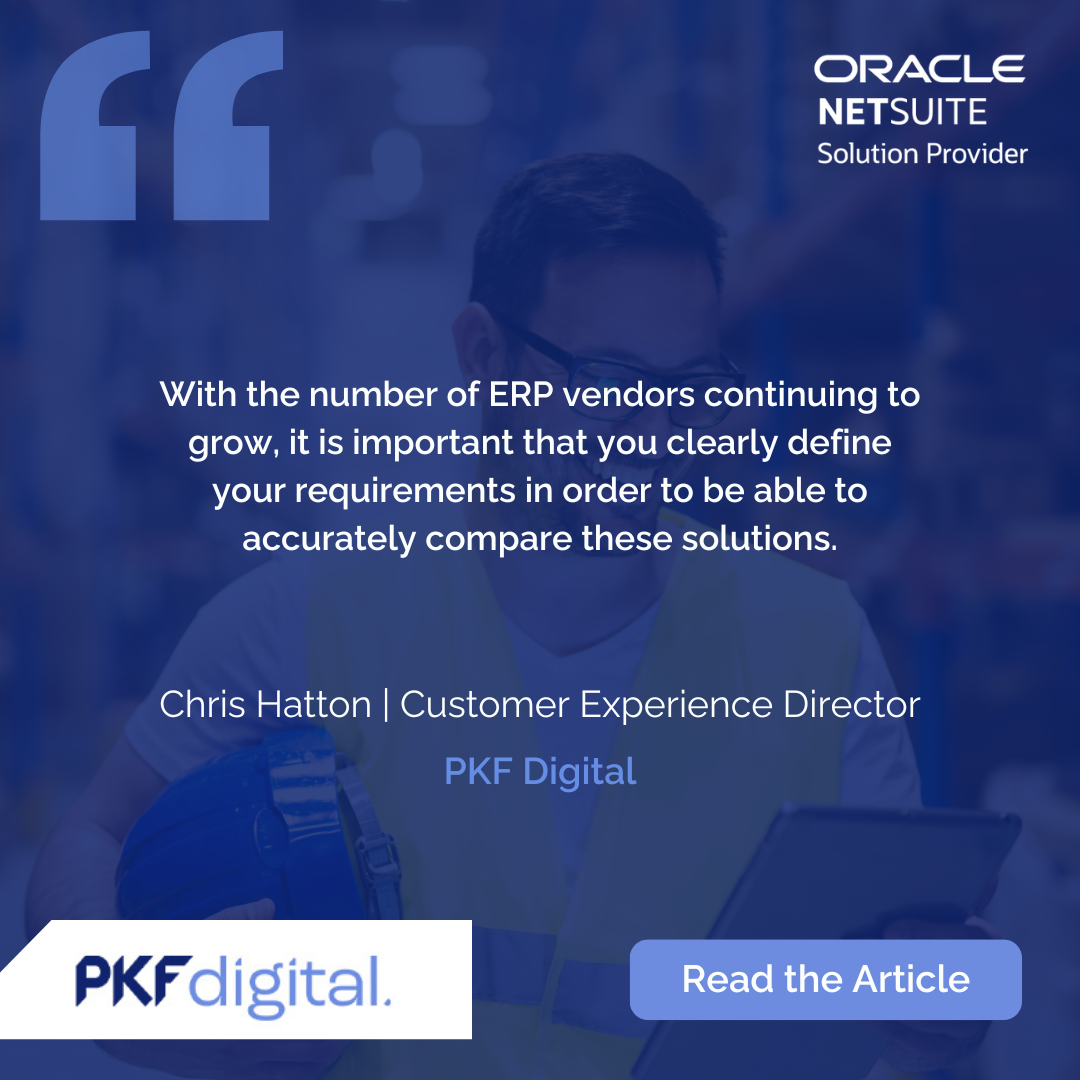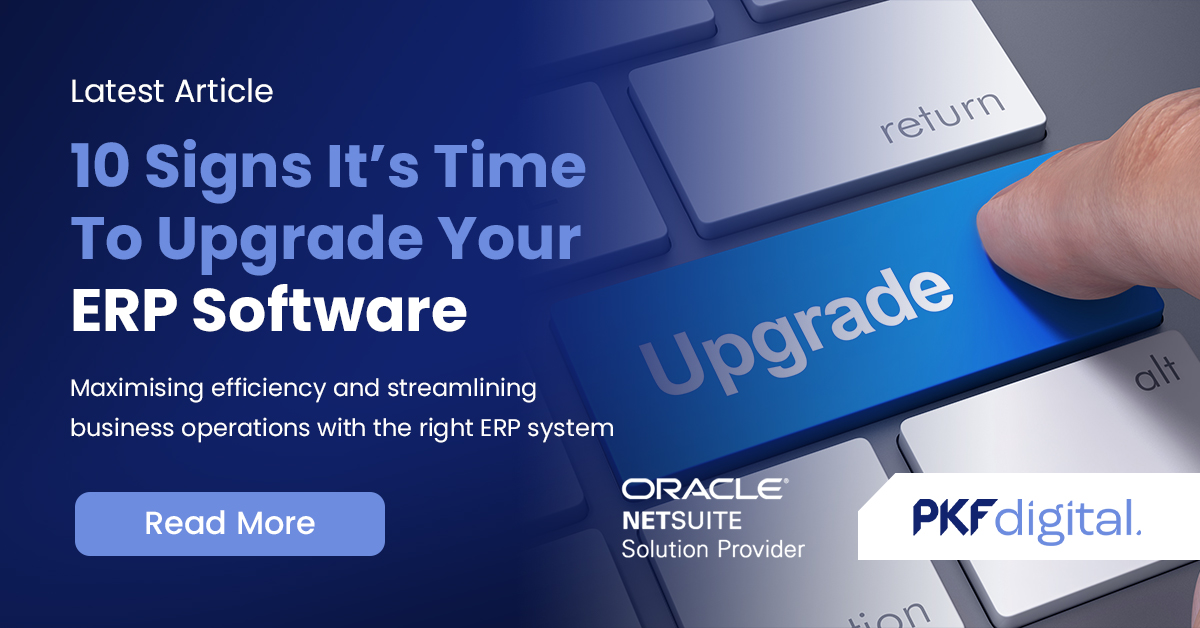ERP Systems, especially when hosted on-premise, eventually come to the end of their useful life. However, knowing when is the right time to upgrade is key to ensuring that your business isn't negatively affected by out-of-date technology or system configurations that no longer support the needs of your team and business as a whole.
Here are ten of the most common signs that it is time to consider upgrading your ERP system:
1. Your current system is struggling to keep up with business growth
As your company grows, so too does the demand on your ERP system. Upgrading to a modern cloud-based ERP like NetSuite, can provide better scalability and flexibility to accommodate new requirements and allow you to capitalise on a more modern technology platform.
2. You’re missing out on the latest innovations in ERP technology
ERP systems are constantly evolving, offering faster performance, enhanced functionality and more advanced features than ever before. If your current system doesn't reflect this evolution, it's likely time to consider alternatives.
3. Your business is relying on outdated customisations, patches and fixes
Customised ERP systems can quickly become outdated if they are not kept up to date with the most recent updates and enhancements. If your business relies on extensive customisations, it may be time for an upgrade to ensure that you're operating with current best practices.
4. Your employees struggle with manual processes
If your employees are spending too much time manually completing tasks that could be automated with a more advanced ERP software, then it's time to consider an upgrade. Automating manual processes can reduce errors, streamline processes and increase productivity.
5. You are having difficulty keeping up with changing regulations and compliance requirements
ERP systems are essential for staying up-to-date with changing regulations. Many legacy ERP systems don't offer the ability to quickly and easily customise the solution to be able to manage these changes. Upgrading to a modern cloud-based ERP, like NetSuite, that can be easily configured can help ensure that your business complies with all changing requirements.
6. Your system limits visibility into real-time data and analytics
Modern ERP systems provide comprehensive data and analytics that can help you gain insights into process performance, customer behaviour, product trends and more. If your current system lacks this type of visibility and insight, then it may be time to consider a modern cloud-based ERP solution.
7. Your business processes have become complex and difficult to manage
When ERP systems become too complex and difficult to manage, it can cause frustration and productivity issues. Often businesses will change their processes to suit their software systems, rather than change their software to support more efficient processes. If your ERP is limiting your ability to adapt, it might be time to look into alternatives.
8. You’re dealing with multiple disconnected systems
If your business is struggling to manage multiple disconnected systems, an ERP upgrade may be in order. Modern ERP solutions provide a unified platform that can integrate with existing systems and provide better visibility into all data and processes thus helping to reduce complexity. With modern API technology, you will be able to connect all systems to ensure you have access to a single source of truth.
9. The cost of maintaining your existing ERP system has become too high relative to its value
Cloud ERP systems like NetSuite offer Software-as-a-Service model pricing, which is typically far more affordable than investing in perpetually licensed software. Additionally, there are often savings to be had from eliminating the cost of maintaining your own data centre or having to hire additional IT staff.
10. You’re not getting adequate customer support and training
Legacy ERP systems may no longer offer the same level of customer service, training and technical support as newer cloud-based solutions. If you’re struggling to get the support you need from your current system, or if the training options are limited, it may be time to consider upgrading.
Key Factors to Consider When Upgrading Your ERP
Upgrading your ERP system is a big decision and should not be taken lightly. With the number of ERP vendors continuing to grow, it is important that you clearly define your requirements in order to be able to accurately compare these solutions.
Before taking the plunge, there are some key factors to consider:
License Fee Commitment
It is important to understand the licence fee commitment before signing any contracts. Ensure that you are aware of all upfront and ongoing costs, required maintenance fees and other potential charges.
Implementation Costs
It is also important to consider the cost of implementation, including any customisation fees and training costs. Be sure to factor in all of these when budgeting for your new ERP system.
Implementation Timeframes
Time is of the essence for most businesses, and it is important to have an understanding of any implementation timeframes before making a decision. It is also important to factor in any additional training that may be needed during this process and when and how this will impact your team's workload.
Total Cost of Ownership
Don’t forget to factor in the total cost of ownership (TCO) when evaluating potential solutions. This includes both direct and indirect costs associated with your ERP solution. Calculating the TCO of various solutions over three, five and ten-year time spans can highlight the real costs that you will be committing to, rather than focussing on short-term costs.

Integration Capabilities
When selecting a new ERP system, it is essential to make sure that the solution you choose can easily integrate with existing applications or third-party systems. Most cloud ERPs like NetSuite offer a set of tools that make integrating third-party solutions much easier than legacy systems.
Business Impacts of Changing Systems
It is important to consider the potential impact that changing systems will have on your business. It is essential to have a clear plan in place to ensure that any disruption is kept to a minimum and all employees are on board with the changes.
In Summary
Upgrading your ERP system can provide a host of benefits for your business, but it is important to ensure that you understand all of the costs involved and carefully evaluate all potential solutions. By taking the time to consider these key factors, you can be sure that you are choosing the best ERP solution to support your business into the future.
About PKF Digital
PKF Digital are a leading NetSuite partner, specialising in helping Australian businesses select, implement and manage their business systems. To learn more about how we can help you upgrade your ERP system, get in touch with us today.


